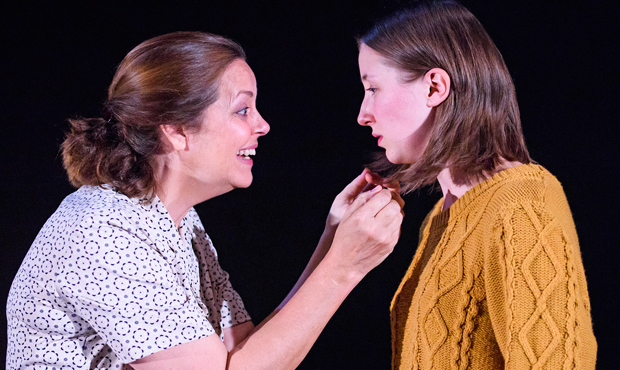The Glass Menagerie (West Yorkshire Playhouse)

© Tristram Kenton
According to his biographer, the estimable critic John Lahr, Tennessee Williams "was the most autobiographical of American playwrights." The Glass Menagerie, then, is basically pure Williams: a guilt-soaked memoir about his family life. It has the lightest of fictional glazes, but Tom Wingfield, the would-be writer cooped up with a domineering, chattering mother and a disabled sister, is Williams in all but name.
Though she keeps the American accents, director Ellen McDougall throws off the play's period setting. Gone is the St Louis tenement block and its cast-iron fire escape. Gone too are the dinky figurines, replaced by a single snow globe. Rather than the exaggerated expressionism of Williams's script, with its giant portrait of Tom's long-gone father above the mantelpiece, Fly Davis's design opts for stark minimalism: a featureless black box suspended over a pool of water, unfurnished but for a staircase to nowhere. There's no way out and nowhere to hide. The Glass Menagerie becomes Huis Clois: three people trapped together forever.
It is not just that there's no escape, but that these people are bad for one another. Greta Scacchi jitters around as Amanda, hustling her children to make something of themselves. She's so clearly shattered by her husband's departure. "He was," she repeats, "a telephone man who fell in love with long distances."
Her son (Tom Mothersdale) retreats into surliness, skulking the flat hands in pockets, and she never allows her daughter to be herself. Erin Doherty's Laura lollops about unevenly in one white wedge shoe – a real constraint standing in for her disability.
The shoe eventually flies off, when her dance with Jim (Eric Kofi Abrefa) bursts into a full-blown jive – symbolic of newfound freedom and confidence. Their encounter, so tender and tiptoeing, suddenly explodes with feeling, enough to make your heart-swell.
More than simply being trapped, all three are cut off from the rest of the world. Their grasp on reality slips, but so too, crucially, does their sense of self. Laura believes her disability far worse than it is. Amanda's behaviour turns strange and stale. They lack the yardsticks of society. A street lamp hangs over the room like a spotlight. "Self, self, self," as Amanda scolds Tom.
With our virtual versions and our self-Googling, we're probably worse. Wires curl through the Wingfield's flat, hanging down into the water – a marker that this is the first networked society. Everyone is more connected, and yet more isolated, than ever before. Amanda throws herself, excessively, into her telesales job. Gentleman callers don't call in person. Gareth Fry's sound design whirs and beeps. Like Tom's father, we have fallen in love with long distances.
Occasionally, it goes OTT: Amanda's dress is ghastly to the point of humiliation and the production pushes so far away from naturalism that it loses sight of the play's careful examination of memory.
Even so, Mothersdale conveys Tom's sighing guilt beautifully, and Doherty makes you feel the ache and the agony of unrequited love. Abrefa, in particular, is superb as Jim: breezing out blind to the bombshell he drops and the emotional devastation it will cause. His gentleman caller's just as self-obsessed as anyone else – the most autobiographical of American playwrights included.
The Glass Menagerie runs at West Yorkshire Playhouse until 3 October before embarking on a short tour. For full details, visit www.headlong.co.uk.










